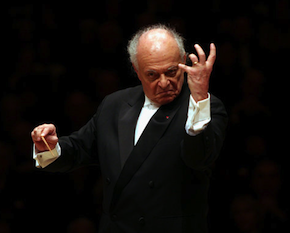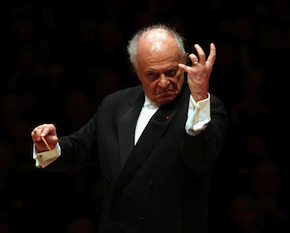
Photo by Hiroyuki Ito
A prominent conductor for an amazing seven decades of his 84 years, Lorin Maazel, who died at his Castleton, VA, home on Sunday, was a major, often controversial figure on the international music scene.
Lorin Varencove Maazel was born in the Parisian suburb of Neuilly-sur-Seine on March 6, 1930. His parents were American music students studying there — Lincoln Maazel, a singer, and Marie Varencove Maazel, a pianist. The child prodigy started conducting at age 9, appeared with major orchestras as a teenager, and became music director of the New York Philharmonic, the Cleveland Orchestra, the Vienna State Opera, Deutsche Oper Berlin, Bavarian Radio Symphony Orchestra, Pittsburgh Symphony and, until his death, the Munich Philharmonic.
Allan Kozinn writes in Maazel's New York Times obituary:
Mr. Maazel was a study in contradictions, and he evoked strong feelings — favorable and otherwise — from musicians, administrators, critics, and audiences.He projected an image of an analytical intellectual — he had studied mathematics and philosophy in college, was fluent in six languages (French, German, Portuguese, Spanish, and Italian, as well as English) and kept up with many subjects outside music — and his performances could seem coolly fastidious and emotionally distant. Yet such performances were regularly offset by others that were fiery and intensely personalized.
He was revered for the precision of his baton technique, and for his prodigious memory — he rarely used a score in performances — but when he was at his most interpretively idiosyncratic, he used his powers to distend phrases and reconfigure familiar balances in the service of an unusual inner vision.
The NPR obituary quotes Alex Ross' profile in The New Yorker: "He is unpredictable: Performances of his that I have heard over the years have ranged from the propulsive to the repulsive, with few subtle shades in between."
The Guardian obituary says of the end of his career:
Only at the beginning of this year did Maazel have to start making cancellations in a still-full conducting schedule; the reason given was an unspecified illness, which would eventually lead to his death from complications due to pneumonia. Having already conducted one Mahler cycle with the Philharmonia orchestra decades back, he had embarked on another. Critics were mostly baffled by the uniformly slow tempi and lethargic approach, which made singing very difficult indeed for a great artist such as the mezzo-soprano Alice Coote in a vocally extraordinary interpretation of Das Lied von der Erde.In June Maazel resigned from his post as music director of the Munich Philharmonic Orchestra and ceded to Semyon Bychkov what would have been a lavish celebration around Richard Strauss's 150th birthday with the Berlin Philharmonic. Maazel's own achievement as a composer remained on a level with his contemporary André Previn. In interview he remarked that, for composers, "there is nothing new under the sun. Everything has been used and done, so it's not the means you use, but how you use them."

